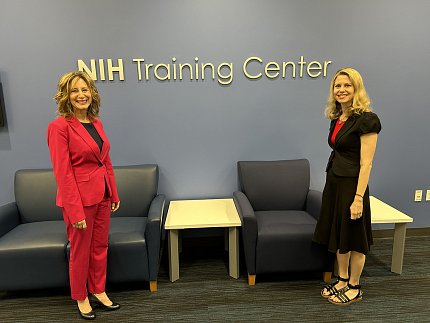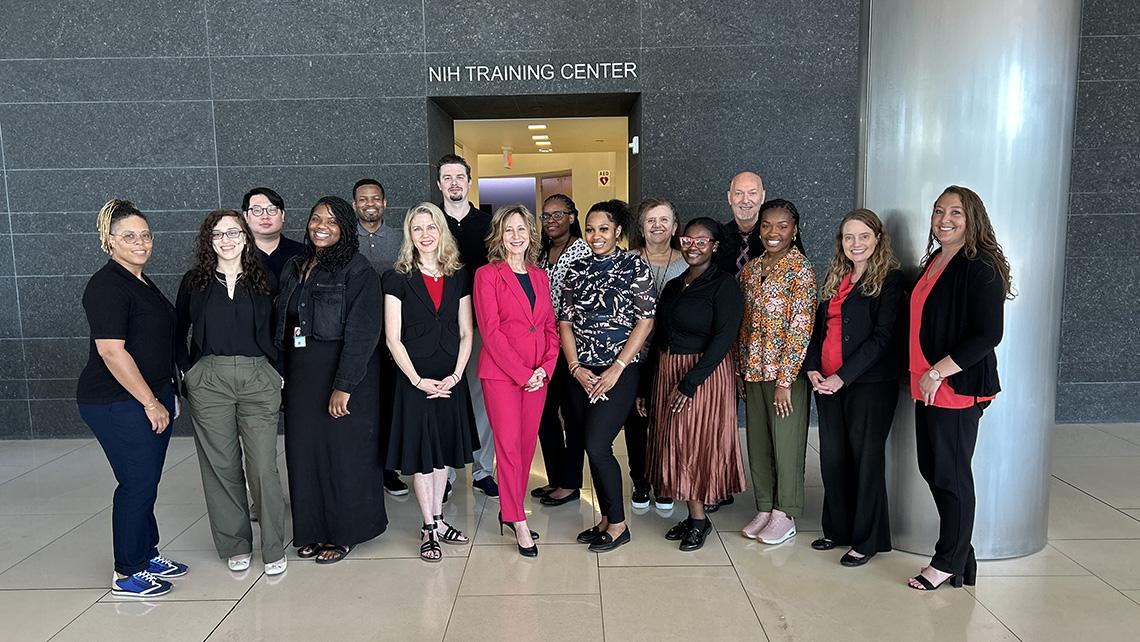Two Decades of Enrichment
Training Center Offers Instruction at Every Level

Photo: Dana Talesnik
You’re ready. You’re motivated. You want to hone an existing skill or learn a new one. Let’s do this! But…where do you find the right course?
Training is valuable at every career level, yet a lot of NIH’ers don’t know where to find growth opportunities. In many cases, you need look no farther than your own backyard.
For 20 years, the NIH Training Center (NIHTC) has provided professional development courses to staff, with a range of offerings that have evolved based on the changing needs of NIH’ers.
“We’ve launched more leadership programs, more career development programs and we’ve expanded the types of course areas that we cover,” said NIHTC Director Elena Juris. “We started from a really strong core. Now we offer more courses and more variety.”
Types of training include leadership and supervisory coaching; individual development consulting; acquisitions, budget and data skills; computer classes; soft skills courses from time management to communication; and the consistently popular pre-retirement planning.
“We now have something for everyone, from Grade-5 all the way through to the senior executive,” said Kristen Dunn-Thomason, director, Workforce Support and Development Division, which oversees the Training Center in NIH’s Office of Human Resources. “It’s pretty unique in terms of having that range of availability.”
In the early days, the NIHTC offered only a senior leadership program. Soon, executive and mid-level leadership programs were added. For a time, NIH’s parent agency, the Department of Health and Human Services (HHS) consolidated and centralized training under the hub of HHS University.
“But we made a last-ditch appeal that we had classes that needed to be done here because they were NIH-specific,” recalled Dunn-Thomason. Eventually, HHS University stopped offering classes and the NIHTC began expanding into the areas that had been under the HHSU purview—soft skills, COR [contracting officer’s representatives] and pre-retirement to name a few.
An ongoing priority since the beginning is the focus on fellows and interns. The Management Intern and the Presidential Management Fellows programs—which predate NIHTC’s founding—remain a big slice of their efforts.
Over the years, NIHTC staff have adapted training based on participant and leadership feedback. More recently, they’ve added civility, diversity and equity courses, the Emerging Talent Program for GS 5-11, and they continue to add specialized group trainings that support each institute and center (IC). Flexibility is key.

Photo: Dana Talesnik
“When the pandemic hit, there was no hesitation. We converted all our classes from in-person to virtual,” recounted Barb LeClair, NIHTC deputy director.
“People had registered and paid for our classes. They needed them,” added Juris. “We found a way to keep that running seamlessly until we could return on site.”
During that difficult period, NIHTC played a vital role as a unifier.
“We bring people together to learn a particular topic and, in pandemic times, that was especially helpful for increasing team morale while people were largely dispersed,” noted LeClair.
Many courses remain virtual though some classes—which benefit from personal connections or hands-on training—have returned in person at the center’s White Flint and campus locations.

The cost of NIHTC courses remains competitive with private companies.
“We provide training [often] at a lower cost while providing NIH-focused content with a network of NIH subject matter experts to help keep our [material] current,” said Juris.
And that fee-for-service flexibility has made the NIHTC somewhat budget-proof over the years, noted Dunn-Thomason.
“We don’t need to wait for a whole budget cycle to change or add programs,” she said. “We never got cut because we make our own revenue.” In fact, they often added classes during tighter budget periods. Of course, if a program is big enough to require additional staff, the new employee slots still must be approved.
“We are a service provider,” said Juris, “but it’s not about selling a service; it’s about providing training for the good of the NIH community.”
• Course catalog: https://go.nih.gov/8mnvp2p
• Leadership Programs: https://go.nih.gov/GQjd0cZ
• Career Development Programs: https://go.nih.gov/CPWpjlU
• Coaching & other individualized services: https://go.nih.gov/cDvq42o
Center staff want NIH’ers to view training as an ongoing investment in learning.
“The Training Center looks at training as a journey,” said LeClair. “That journey could involve attending future classes or seeking advice or coaching, in addition to our leadership programs.”
“We’re finding the more programs we offer, alumni communities that pay it forward,” said Juris. Many program graduates become mentors. Some find other ways to get involved, such as serving on panels.
But if the term “training” conjures up thoughts of “mandatory training,” know that NIHTC’s role is only to help make it easier.
“None of the ‘mandatory training’ is actually put out by us,” Juris said. “We just help corral it and trim it down.”
Some years ago, NIHTC staff evaluated mandatory training with NIH leaders and representatives across the ICs. As a result, some mandates were discontinued and others were consolidated. In surveys, staff found it easier to get through a bunch of training at once instead of taking a new training every month. From there, the IT security/privacy/records management/emergency preparedness courses were combined into one.
“We grouped them and advised on the schedule,” said Dunn-Thomason, so that it’s an annual rather than a monthly requirement.
As for the class catalog, NIHTC staff monitor feedback from multiple sources to gauge demand.
“What we decide on offering is not based on one source of guidance or direction,” said Juris. There’s feedback from evaluations and data from enrollment figures. Sometimes senior leaders request a particular training. NIHTC also pilots different ideas and reassesses.
Each spring, staffers do a deep dive on what to offer in the fall. “We try to keep the good things running before we launch something else,” Juris added.
“We’re always trying to check the pulse on what’s happening at NIH,” said Danielle Sullivan. “What are people interested in? Did we exhaust that topic?”
Sullivan is one of the NIHTC’s program managers, each of whom has one or more specialized areas. They not only run the courses, but they also audit them to make sure the topics and instructors are engaging.
In celebrating NIHTC’s 20th anniversary, Juris reflected on its evolution.
“I think about our resilience because, looking back—having been here since 2007—it doesn’t matter what’s thrown at us. We keep our doors open and we keep offering the service. Some training offices, when going through a difficult time, close up shop for a while, but we just keep it running.”
